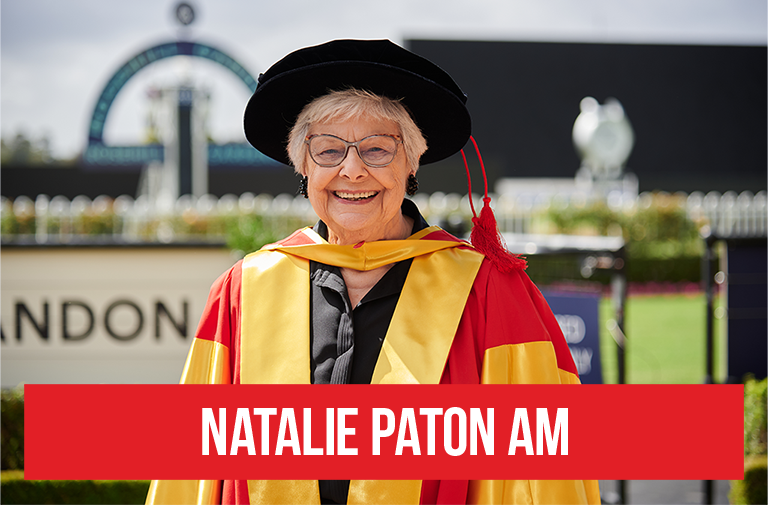When Australian Catholic University (ACU) awarded an Honorary Doctorate to Natalie Mary Paton AM this week, it was in recognition of her role in supporting new mothers.
Mrs Paton founded the Nursing Mothers Association – later renamed the Australian Breastfeeding Association (ABA) – in 1964, and received a Doctor of the University in Sydney yesterday, 17 October.
It is Mrs Paton’s first honorary doctorate from an Australian university.
“I am so amazed and so honoured to be receiving this honour from ACU,” Mrs Paton said. “I look at this honour as an award to the many hundreds of ABA volunteer counsellors and office bearers who have dedicated their time and support to mothers over nigh on 60 years. What they have achieved is outstanding.”

After experiencing breastfeeding struggles with her own child, Mrs Paton’s motivation to establish the support association was sparked by reading a Readers’ Digest article about a similar support structure for mothers in the United States. She then convinced five others mothers to start the Nursing Mothers’ Association in Melbourne.
“I expected to breastfeed because I believed it was the right thing to do, physically and psychologically, but it wasn’t successful,” Mrs Paton said. “I realised emotionally this was a shocking thing for my daughter, I could really see that she was hurt by it.”
Almost sixty years later, the now national organisation, which changed its name in 2001, has supported thousands of families with breastfeeding guidance and education.
Mrs Paton received her honorary doctorate before ACU health graduates from Sydney, nearly 70 years after she graduated as an Occupational Therapist.
Although Mrs Paton acknowledges that so much has been done to support new mothers, she says that the education and support will always be needed.
“A major reason is that every new breastfeeding mother requires the shoulder of an experienced mother, and assistance from well-informed and educated health professionals,” Mrs Paton told The Bursar. “Every year, new research information highlights this need. The advantages of breastfeeding are so important and the more we can educate mothers with evidenced-based information and support, the more likely a healthy happy child, contented mother, and family. This has always been the case, but more so today with the growth of Western society, family breakdowns appearing to be increasing, mothers are stressed about needing to return to work too soon, and now so many infant illnesses – which once that infant did not overcome – are evident today, and require very specific breastfeeding assistance.”
Her advice to incoming health care sector graduates includes drawing on the wealth of research and knowledge those before them have worked hard to gather.
Of course, she says, logging into the Australian Breastfeeding Association website is a must.
“Annual breastfeeding professionals’ seminars held in every capital city are very popular,” Mrs Paton says.
She also highlights the importance of ongoing education, including exploring health professional workshops, undertaking diplomas in breastfeeding management, investigating special modules to engage in, connecting with the available, up-to-date and evidenced based breastfeeding information services, as well as reading evidence-based booklets and the quarterly professional journal designed to share innovation and education from around the world.
“It is possible for one person to make a difference – not necessarily building an organisation – but as you graduates enter your profession and career, your journey can be full of satisfaction and pleasure as you treat and support your patients.”








